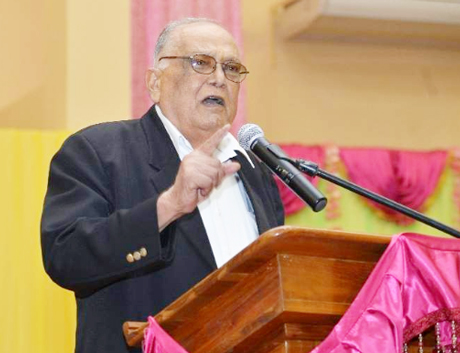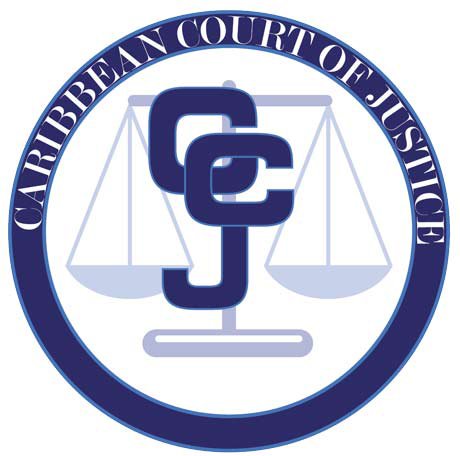
Sanantan Dharma Maha Sabha
Port-of-Spain – Secretary general of the Sanantan Dharma Maha Sabha Satnarayan Maharaj has taken legal action against the Attorney General seeking to strike out sedition laws in Trinidad and Tobago.
In a sworn affidavit, Maharaj stated he fearlessly and unapologetically speaks out against injustice and inequality, and his right to freedom of expression under the Constitution conflicts with sedition laws.
Legal documents were filed on Saturday in the High Court on behalf of Maharaj and the Central Broadcasting Services Ltd by attorneys from Fortis Chambers, including Kiel Teelucksingh, Jagdeo Singh, and Stefan Ramkisoon.
The attorneys noted their clients were subjected to the execution of a search warrant on April 18 by nine police officers, purportedly obtained under Section 13 of the Sedition Act, which contemplates and/or suggests there may be reasonable grounds to suspect an offence created by the Sedition Act has been committed.
They stated Maharaj, therefore, faces “the very real prospect of being criminally prosecuted” pursuant to the Sedition Act, Chapter 11:04.
The documents stated since the ‘raid’ on Central Broadcasting Services Ltd, Satyanand Maharaj, a former schoolteacher, was approached by Cpl Patrick and Constable Chadee of a Special Services Unit of the Police Service on May 15, 2019, to interview him regarding statements Maharaj (Sat) made about Tobagonians.
The attorneys stated Satyanand Maharaj declined to make any statement.
“He (Satyanand Maharaj) was subsequently harassed by the said police officers to consider making and signing a statement to suggest and imply that Satnarayan Maharaj made statements about Tobagonians that would encourage seditious behaviour by elements in the population,” the document stated.
“He (Satyanand Maharaj) was concerned that there is a plot and conspiracy to orchestrate an artificial legal case against Satnarayan Maharaj. On May 29, 2019 police officers visited him again, insisting that he (Satyanand) give a statement. He however declined,” the document added.
Said Maharaj: “Speaking out in the manner I have done during my life lies at the heart of what feisty, opinionated, truth-telling individuals like me do. Striking down the impugned provisions of the Sedition Act would not only be good for freedom of speech, media, and journalism, it would also be good for democracy. The Constitution is far better served by permitting dissenting views and/or destructive criticism (if it exists), in the pursuit of free expression, than it is by outlawing it and rendering every citizen mute.”
He added: “I believe in social equity, freedom and equality for all citizens of my beloved country. At all times I fight for these ideals in a non-violent way by speaking out freely in a passionate manner. I therefore consider my freedom of speech and that of Central Broadcasting Services Ltd as well as the citizenry, and the right of the people peaceably to assemble and consult for their common good, and to apply to the Courts for redress of grievances as tangible rights worth fighting for. In this regard, I consider any law which seeks to condemn me for exercising my freedom of expression to be unconstitutional. Further, there can be no true enjoyment of constitutional rights if all general provisions and propositions of law, once adopted, remain unchanged.”
Maharaj who has been an executive SDMS member said he has been in media business since 1970.
In a sworn affidavit, Maharaj stated he fearlessly and unapologetically speaks out against injustice and inequality, and his right to freedom of expression under the Constitution conflicts with sedition laws.
Legal documents were filed on Saturday in the High Court on behalf of Maharaj and the Central Broadcasting Services Ltd by attorneys from Fortis Chambers, including Kiel Teelucksingh, Jagdeo Singh, and Stefan Ramkisoon.
The attorneys noted their clients were subjected to the execution of a search warrant on April 18 by nine police officers, purportedly obtained under Section 13 of the Sedition Act, which contemplates and/or suggests there may be reasonable grounds to suspect an offence created by the Sedition Act has been committed.
They stated Maharaj, therefore, faces “the very real prospect of being criminally prosecuted” pursuant to the Sedition Act, Chapter 11:04.
The documents stated since the ‘raid’ on Central Broadcasting Services Ltd, Satyanand Maharaj, a former schoolteacher, was approached by Cpl Patrick and Constable Chadee of a Special Services Unit of the Police Service on May 15, 2019, to interview him regarding statements Maharaj (Sat) made about Tobagonians.
The attorneys stated Satyanand Maharaj declined to make any statement.
“He (Satyanand Maharaj) was subsequently harassed by the said police officers to consider making and signing a statement to suggest and imply that Satnarayan Maharaj made statements about Tobagonians that would encourage seditious behaviour by elements in the population,” the document stated.
“He (Satyanand Maharaj) was concerned that there is a plot and conspiracy to orchestrate an artificial legal case against Satnarayan Maharaj. On May 29, 2019 police officers visited him again, insisting that he (Satyanand) give a statement. He however declined,” the document added.
Said Maharaj: “Speaking out in the manner I have done during my life lies at the heart of what feisty, opinionated, truth-telling individuals like me do. Striking down the impugned provisions of the Sedition Act would not only be good for freedom of speech, media, and journalism, it would also be good for democracy. The Constitution is far better served by permitting dissenting views and/or destructive criticism (if it exists), in the pursuit of free expression, than it is by outlawing it and rendering every citizen mute.”
He added: “I believe in social equity, freedom and equality for all citizens of my beloved country. At all times I fight for these ideals in a non-violent way by speaking out freely in a passionate manner. I therefore consider my freedom of speech and that of Central Broadcasting Services Ltd as well as the citizenry, and the right of the people peaceably to assemble and consult for their common good, and to apply to the Courts for redress of grievances as tangible rights worth fighting for. In this regard, I consider any law which seeks to condemn me for exercising my freedom of expression to be unconstitutional. Further, there can be no true enjoyment of constitutional rights if all general provisions and propositions of law, once adopted, remain unchanged.”
Maharaj who has been an executive SDMS member said he has been in media business since 1970.
fails at CCJ

Port of Spain – The Trinidad and Tobago based Caribbean Court of Justice (CCJ) last Wednesday ruled that citizens of the Caribbean Community (CARICOM) “have important rights but to exercise these rights clear documentary evidence of their nationality is required.”
The ruling was handed down in the case of Bain vs Trinidad and Tobago.
Bain, a citizen of both Grenada and the United States had claimed that his right to freedom of movement was infringed when he was denied entry into the twin-island state when arriving from Grenada just before midnight on December 14, 2017.
It’s reported that on that day, he presented himself as an American citizen, producing only his USA passport, as his Grenadian passport had expired some years earlier.
Upon arrival at Piarco International Airport, immigration officials questioned him concerning information they had received about a man with the same name who has convictions on drug-related offences. Although he denied any drug convictions, Bain was refused entry and was sent back to Grenada on an early flight the following day although he had also informed the immigration officers that he was a citizen of Grenada and thus entitled to freedom of movement in Caribbean Community (CARICOM) states.
As evidence of his citizenship, Bain had produced his Grenadian driver’s licence, which stated that he was a Grenadian citizen.
He also showed his Grenadian voter’s identification card which stated that he was born in Grenada. In addition, his US passport also listed Grenada as his country of birth.
Bain then argued that the documents should have been enough to invoke his right of freedom of movement.
In its judgment on Thursday, the court determined that, while there was no doubt that Bain is a Grenadian citizen, he did not present sufficient documentation to prove it to the immigration officers.
The court stated that the presentation of the Grenadian driver’s licence and voter’s identification card was not sufficient as unlike the Grenadian passport, neither document was meant to serve as evidence of citizenship and in addition, they were neither machine-readable nor designed to be stamped by immigration officials.
The court also rejected the argument that the notation in Bain’s US passport that he was born in Grenada, conclusively proved citizenship.
It was also noted that it was possible that Bain could have renounced his citizenship, or have it stripped away by the Grenadian government, while mere birth in a country does not always automatically evidence citizenship.
The CCJ considered whether Bain waived his right to free movement, as a national of Grenada, when he presented his US passport.
The court noted that if someone with dual citizenship exercises their rights attached to one nationality, it does not eliminate their other nationality and the rights attached to that citizenship.
“Therefore, if Mr Bain was denied entry based on his US passport, he could still claim his rights under the Revised Treaty of Chaguaramas if he could forthwith prove that he is Grenadian citizen,” the court noted.
The court also relied on submissions from the Caribbean Community which stated that the “appropriate travel document to invoke the right of freedom of movement is the CARICOM passport or a passport issued by a CARICOM Member State”.
The CCJ concluded that all the documents Bain presented did not conclusively establish his Grenadian nationality.
In the judgment, the court emphasised that the “onus lies upon an intended entrant into a CARICOM Member State to establish that he or she is a national of such a State with the right to freedom of movement”.
The CCJ dismissed the claims against Trinidad and Tobago and ordered the parties to bear their own costs.
The ruling was handed down in the case of Bain vs Trinidad and Tobago.
Bain, a citizen of both Grenada and the United States had claimed that his right to freedom of movement was infringed when he was denied entry into the twin-island state when arriving from Grenada just before midnight on December 14, 2017.
It’s reported that on that day, he presented himself as an American citizen, producing only his USA passport, as his Grenadian passport had expired some years earlier.
Upon arrival at Piarco International Airport, immigration officials questioned him concerning information they had received about a man with the same name who has convictions on drug-related offences. Although he denied any drug convictions, Bain was refused entry and was sent back to Grenada on an early flight the following day although he had also informed the immigration officers that he was a citizen of Grenada and thus entitled to freedom of movement in Caribbean Community (CARICOM) states.
As evidence of his citizenship, Bain had produced his Grenadian driver’s licence, which stated that he was a Grenadian citizen.
He also showed his Grenadian voter’s identification card which stated that he was born in Grenada. In addition, his US passport also listed Grenada as his country of birth.
Bain then argued that the documents should have been enough to invoke his right of freedom of movement.
In its judgment on Thursday, the court determined that, while there was no doubt that Bain is a Grenadian citizen, he did not present sufficient documentation to prove it to the immigration officers.
The court stated that the presentation of the Grenadian driver’s licence and voter’s identification card was not sufficient as unlike the Grenadian passport, neither document was meant to serve as evidence of citizenship and in addition, they were neither machine-readable nor designed to be stamped by immigration officials.
The court also rejected the argument that the notation in Bain’s US passport that he was born in Grenada, conclusively proved citizenship.
It was also noted that it was possible that Bain could have renounced his citizenship, or have it stripped away by the Grenadian government, while mere birth in a country does not always automatically evidence citizenship.
The CCJ considered whether Bain waived his right to free movement, as a national of Grenada, when he presented his US passport.
The court noted that if someone with dual citizenship exercises their rights attached to one nationality, it does not eliminate their other nationality and the rights attached to that citizenship.
“Therefore, if Mr Bain was denied entry based on his US passport, he could still claim his rights under the Revised Treaty of Chaguaramas if he could forthwith prove that he is Grenadian citizen,” the court noted.
The court also relied on submissions from the Caribbean Community which stated that the “appropriate travel document to invoke the right of freedom of movement is the CARICOM passport or a passport issued by a CARICOM Member State”.
The CCJ concluded that all the documents Bain presented did not conclusively establish his Grenadian nationality.
In the judgment, the court emphasised that the “onus lies upon an intended entrant into a CARICOM Member State to establish that he or she is a national of such a State with the right to freedom of movement”.
The CCJ dismissed the claims against Trinidad and Tobago and ordered the parties to bear their own costs.


